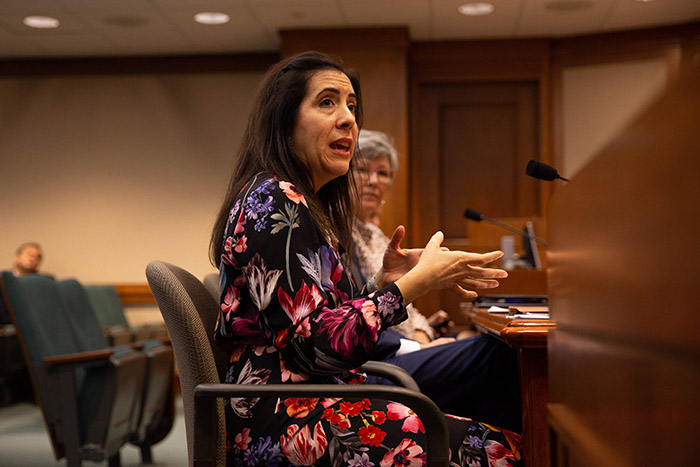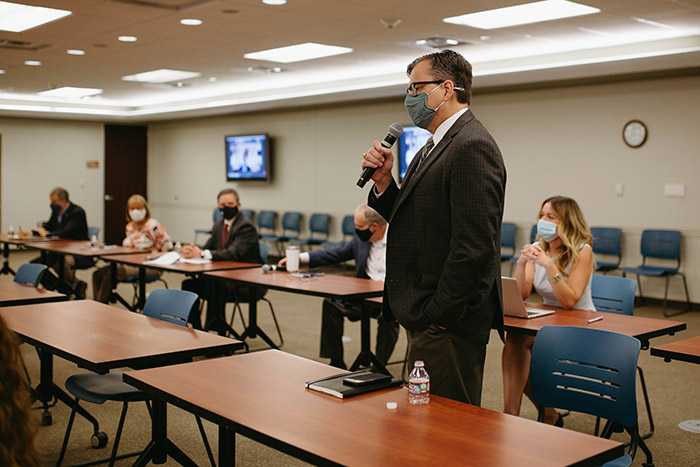Since its inception, the Texas Hospital Association has passionately advocated for its member hospitals on a multitude of issues at both the state and federal levels. THA’s advocacy and public policy division has tirelessly supported hospitals on the front lines of the COVID-19 pandemic while quickly responding to other recent events—including last winter’s historic blackout, three special legislative sessions and the recission of the Medicaid 1115 waiver extension.
In THA’s early days, the chief executive officer and outside general counsel would serve as the primary advocates for Texas hospitals before Congress and the legislature. In the late 1970s, a three-person government relations team began to evolve, and by 1987 a new advocacy and public policy department had formed to represent the interests of the state’s hospitals to key decision-makers.

Longtime advocacy veteran Jennifer Chapman Banda took the reins of the advocacy and public policy team on Jan. 1 from John Hawkins, who became THA’s newest president and CEO. Banda joined THA’s advocacy team in 2003 as a former legislative staffer and health and human services adviser to former Texas House Speaker Pete Laney.
“It’s been incredibly interesting and rewarding to be in an association that’s at the forefront of working in health care policy and navigating the changes in that world,” said Banda. “I’m excited to work collaboratively on solutions to these tough issues and continue all the great work our association does with advocacy.”


In January, THA also promoted Carrie Kroll to Banda’s former position as vice president of advocacy, public policy and political strategy. Sara González, a veteran of THA’s advocacy team, has been tasked with additional policy and advocacy issues in her current role as vice president of advocacy and public policy. Cameron Duncan joined the advocacy team as vice president of advocacy and public policy from his former role as associate general counsel.
Securing Vital Resources
Working alongside THA’s in-house legal counsel and policy advisers, the advocacy division helped secure critical resources and governmental action for Texas hospitals facing an unprecedented pandemic throughout the past year.

“Hospitals are highly regulated entities, and to be successful during the pandemic there have to be waivers in place at statutory and regulatory levels,” said Kroll “We did a lot of educating and were focused on those in charge having the leniency to make the right choices that would maintain hospitals’ ability to pivot and respond to the crisis.”
Through THA’s exhaustive advocacy response, hospitals received billions in Provider Relief Funds and other COVID-19-related funding, as well as federal waivers and state flexibilities, staffing assistance, liability protection and vaccine support. The advocacy team ensured Texas hospitals were represented in vaccine allotments, therapeutics distributions, personal protective equipment, staffing assistance and data reporting support.

A key issue for hospitals operating in a pandemic was liability protection for health care providers acting in good faith, which THA helped negotiate and enact with the passage of Senate Bill 6 during the 87th regular legislative session.
When session kicked off last January, COVID-19 cases surged across Texas, and no one knew what to expect from lawmakers convening in Austin. In anticipation of restricted access to the capitol building and personnel, THA prioritized vaccinations for staff and compliance with safety measures like testing and masking when entering the building, and pivoting to virtual meetings when necessary.
Digital advocacy efforts were also amplified ahead of session with the launch of an improved mobile app that features recordings of THA testimony and automated notifications.
“We had to recreate the ways we advocate for hospitals to work in that environment,” said Banda. “We did everything we could to work with the regulatory agencies and legislative and congressional leadership, while still balancing our membership being in the midst of a huge surge in cases.”
As the regular 140-day session stretched into overtime with three special sessions, THA staff frequently testified both virtually and in-person before House and Senate committees while tracking more than 1,000 bills through the legislative process. Despite the enormous challenges, THA was able to produce major gains for its hospital members.
A significant success was securing state funding to help cover the extraordinary expenses hospitals incurred from serving on the front lines of the pandemic, while concurrently protecting health care programs and services available to Texans.
The comptroller issued an improved revenue estimate during session that allowed lawmakers more flexibility in crafting the 2022-2023 state budget, which includes $25.1 billion for Texas Medicaid. THA helped obtain funding for most of Texas hospitals’ priority budget items, such as $361 million to maintain existing Medicaid rate enhancements for safety net, trauma and rural hospitals.
THA was at the forefront of advocating for financing to cover additional health services for Texans. Nearly half a billion dollars was appropriated for inpatient and outpatient behavioral health care, including $321 million out of the Economic Stabilization Fund for inpatient state psychiatric hospital construction and renovation and $86 million in general revenue to bring new inpatient beds at state psychiatric hospitals online.
THA’s advocacy team helped bolster hospitals’ ability to care for new mothers. The current state budget includes $7 million for statewide maternal safety initiatives as well as $47.5 million to extend postpartum Medicaid coverage from two to six months.
Hospitals have long faced staffing shortages. The state budget commits $199 million to expand the graduate medical education program, representing a $42 million increase over the previous biennium, and $19 million help reduce the nursing workforce shortage.
Responding in Real Time
Hospitals’ response to COVID-19 was primed to be a major issue going into the legislative sessions last year. Then in February, Winter Storm Uri wiped out power across the state for days. Suddenly, continuity of health services like dialysis treatment needed legislative action.
“We had to transition and tackle those issue on the spot,” said Banda, who notes that the legislation strengthening requirements to ensure dialysis access during emergencies was drafted by THA staff in a hotel lobby because of loss of electricity at home.
By sine die THA’s advocacy team produced several legislative wins for Texas hospitals. This included legislation preserving the prohibition on carrying weapons in hospitals, blocking attempts to undermine the Texas Advance Directives Act and other end-of-life policies and guaranteeing hospital investigations are fair and transparent.

Last April, the Centers for Medicare & Medicaid Services rescinded the 10-year Medicaid 1115 waiver extension that had been previously approved in January, which caused more than $5 billion in expected supplemental Medicaid payments to Texas hospitals to expire in September.
THA’s advocacy team has mobilized a push aimed at the Texas congressional delegation on the profound impact a permanent waiver recission poses for Texas hospitals. Efforts include letters to lawmakers, video calls with congressional members and staff, whitepapers, statements, social media messaging, state and federal comment letters, and collaboration with advocacy partners representing other health care association in Texas.

“We’ve been trying to put real impact from the perspective of the hospitals into the mix and connect it to the impact on patients, and the risk the situation has created for patient care and the ability to have a comprehensive safety net,” said Anna Stelter, senior director of policy analysis at THA, who works closely with the advocacy team on issues. “It’s one thing for the state to convey that message, but it’s another to hear it directly from those that are providing the care and seeing the patients.”
THA is in continuous dialogue with the Texas Department of Health and Human Services as it negotiates with CMS on possible funding solutions and approval of health care programs.
While awaiting a final decision on the status of the waiver and the myriad programs it affects in Texas hospitals, THA is keeping members abreast of all developments and communications between state and federal agencies through regular conference calls and member briefings, as well as the Health Care Advocate weekly advocacy-focused newsletter and breaking news alerts.
Looking to 2022 and Beyond
As a new year begins, THA’s advocacy team remains hard at work on several key issues relevant to hospitals. In addition to protecting federal coverage for Texas hospitals with the Medicaid 1115 waiver and Directed Payment Programs, THA is monitoring federal developments in the Build Back Better package, price transparency rules contained in the No Surprises Act, as well as providing guidance to hospitals over federal health authorities’ vaccines requirements for workers.
Staffing shortages have plagued hospitals for years, but the ongoing pandemic has exacerbated the crisis. Last fall, THA issued recommendations for HHSC’s Legislative Appropriations Request for the 2024-2025 state budget that, among other topics, suggests the agency request a one-time grant opportunity to alleviate hospitals’ pandemic-related workforce costs.
Additionally, THA is creating a comprehensive membership workforce task force to develop priorities and plans around addressing workforce shortages in hospitals. “We must figure out how we can continue to grow the workforce and keep them in Texas, and keep them working in the hospitals,” said Banda. “Addressing the nursing shortage has always been a priority for THA.”
With hospitals still managing spikes in COVID-19 cases across the state as new variants arise, ongoing pandemic support remains vital to THA’s advocacy mission as well.
Elections this year are expected to be contentious following a redrawing of Texas’ state and congressional maps last year that left many seats up for grabs. THA’s bipartisan political action committee, HOSPAC, serves as a key component to building crucial relationships with lawmakers who understand and will support the needs of Texas hospitals through thoughtful health care policy. In the 2020 general election, 170 out of 174 HOSPAC-endorsed candidates won their races.
“We’ve had such great membership participation with HOSPAC, and it’s set up for success moving forward,” said Kroll. “The challenge is how we keep people interested in politics, especially in a heated environment, as well as trying to make sure we support the right people running for office.”
As the election cycle plays out in 2022 and new lawmakers head to Washington, D.C., and Austin in 2023, THA’s advocacy team stands ready to continue ensuring hospitals have the resources and backing they need to provide health care services for all Texans.

Recent Wins
- $25.1 billion for Texas Medicaid
- $123.4 million for rural hospital services
- Nearly half a billion for inpatient and outpatient behavioral health care
- $47.5 million to extend postpartum Medicaid coverage from two to six months
- $199 million to expand graduate medical education program
- $19 million to reduce nursing shortage
- Expanding children’s Medicaid eligibility, reducing eligibility checks
- Establishing a new drug savings program
- Liability protection for providers acting in good faith during the pandemic
- Strengthening dialysis requirements to ensure access during an emergency
- Maintaining reimbursements for telehealth services made available during the pandemic
- Continuing a prohibition on carrying weapons in hospitals
- Blocking efforts to undermine the Texas Advance Directives Act
- 170 out of 174 HOSPAC-endorsed candidates winning the general election in 2020
Ongoing Priorities
- Securing extension or renewal of Texas’ Medicaid 1115 Waiver
- Health care costs and price transparency in federal No Surprises Act
- Monitoring negotiations in federal Build Back Better legislative package
- Creating solution for Medicaid Coverage Gap
- Securing funding to offset pandemic-related costs
- Medicaid rate enhancements for trauma, safety-net and rural hospitals
- Fully funding maternal Medicaid coverage to six months
- Increasing reimbursement for inpatient behavioral health care
- Programs to increase health care workers
- Increasing awareness of COVID-19 and flu vaccines
- Ensuring equitable access to health care services
- IMD exclusion waiver
